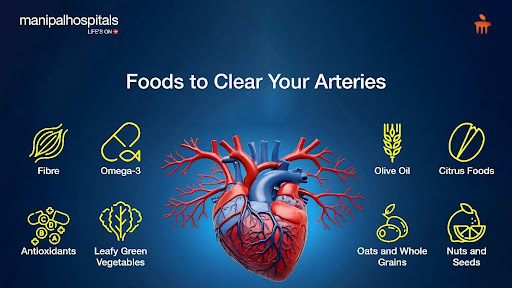
Cardiovascular diseases (CVD) are a leading cause of concern worldwide, and India is no exception. According to the National Centre for Biotechnology Information (NCBI), India carries a significant burden of CVD, with projected annual deaths ranging from 2.26 million to 4.77 million in 2020. Heart health is largely determined by our diet. While there's no single "miracle meal" to clear arteries completely, incorporating specific foods for coronary artery disease into your diet can significantly reduce the risk of heart disease and promote overall cardiovascular health.
Understanding Clogged Arteries
Before diving into the dietary heroes, let's understand how arteries become clogged in the first place. This condition, known as atherosclerosis or coronary artery disease, occurs when fatty deposits (plaque) build up along the inner walls of the arteries. These deposits can narrow the arteries, reducing blood flow to the heart and increasing the risk of heart attack, stroke, and other complications. Several factors that contribute to this process are listed below:
-
High cholesterol
-
Diabetes
-
Smoking
-
Unhealthy diet

American Heart Association recommended a healthy dietary pattern that should include:
-
Fruits, vegetables, whole grains, and beans and legumes.
-
Dietary products that are low in fat or fat-free, fish, poultry, nuts and non-tropical oils.
-
Limits added sugar, sugar-containing beverages, highly processed foods, refined carbohydrates, saturated fats, and fatty or processed meats.
Dietary Arsenal: Foods to Clear Your Arteries
Dietary modifications can significantly impact your heart health. Here are some foods for coronary artery disease to include in your meals:
1. Omega-3 Rich Foods: Omega-3 fatty acids are essential for heart health. It helps to reduce inflammation, lower blood pressure, decrease triglyceride levels and prevent the formation of artery plaque. Fatty fish like salmon, mackerel, sardines, and herring are packed with omega-3 fatty acids. One should include at least two servings of omega-3-rich food per week.
2. Fibre Powerhouses: Dietary fibre helps to reduce cholesterol levels in the blood, which can prevent plaque build-up in the arteries. Some of the fibre-packed foods are fruits, vegetables, whole grains and nuts. Consuming a variety of these foods can significantly benefit your cardiovascular health and it’s the best diet for arteriosclerosis.
3. Antioxidant for the Rescue: Oxidative stress causes inflammation and artery damage, which antioxidants combat. Berries, dark chocolate, green tea and vegetables like carrots and sweet potatoes are excellent sources of antioxidants.
4. Leafy Green Vegetables: Leafy greens like spinach, kale, and collard greens are rich in nitrates, which help relax blood vessels and improve blood flow. Additionally, they are low in calories and packed with essential vitamins and minerals.
5. Citrus Saviours: Citrus fruits such as oranges, grapefruits, and lemons are excellent sources of vitamins, minerals and antioxidants. They are particularly high in vitamin C, which can help lower blood pressure and improve blood vessel function.
6. Olive Oil: Olive oil, especially extra virgin olive oil, is a staple of the Mediterranean diet and is well-known for its heart-healthy properties. A diet rich in monounsaturated fats and antioxidants can reduce inflammation, cholesterol, and arterial plaque build-up. Using olive oil as your primary cooking oil is a great step towards better heart health. Other oils which can be used are soybean oil, corn oil, sunflower oil, rice bran and sesame seed oil.
7. Nuts and Seeds for a Heart-Healthy Crunch: Almonds, walnuts, flaxseeds, and chia seeds are all excellent sources of healthy fats, fibre, and plant sterols, which can help lower LDL cholesterol. Regular consumption of nuts and seeds helps to reduce the risk of heart disease.
8. Oats and Whole Grains: Whole grains, including oats, barley, quinoa, and brown rice, are excellent sources of dietary fibre, particularly soluble fibre, which can help lower cholesterol levels. Starting your day with a bowl of oatmeal or incorporating whole grains into your meals can contribute significantly to arterial health.
Book an appointment with our expert Cardiology Doctors in Goa to map out your diet further.
Conclusion
It is more important to focus on the complete quality of the diet than any particular nutrient or food. Avoid eating foods with high calories but low nutritional value. A balanced and varied diet is key. Incorporate these heart-healthy foods into your meals throughout the week. This doesn't mean eliminating all your favourite treats but focusing on a healthy overall dietary pattern. Consult our Cardiology Hospital in Goa for personalised nutritional advice specific to your health needs. Making smart food choices and adopting a heart-healthy lifestyle can significantly reduce your risk of coronary artery disease and keep your cardiovascular system functioning optimally. Check out our blog page to know the latest updates in the medical world.
FAQ's
Clogged arteries, also medically known as atherosclerosis, occur when a build-up of fatty material called plaque hardens inside the arteries. This narrows the arteries and restricts blood flow to your organs and tissues.
Several factors can contribute to clogged arteries, including:
-
High cholesterol levels, particularly high LDL (bad) cholesterol
-
High blood pressure
-
Smoking
-
Diabetes
-
Obesity
-
Family history of heart disease
Clogged arteries often don't cause any symptoms until a significant blockage occurs. In some cases, you might experience chest pain (angina), shortness of breath, pain in the legs, or erectile dysfunction.
Healthy lifestyle changes can significantly reduce your risk of clogged arteries, such as eating fruit, vegetables, and whole grains rich in vitamins and minerals.


















12.png)
 4 Min Read
4 Min Read



.png)










